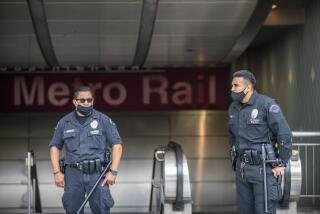An Exhausted Battle Goes On
- Share via
The Metropolitan Transportation Authority Board of Directors voted Wednesday to implement a long-contested federal consent decree while simultaneously continuing to fight it all the way to the U.S. Supreme Court. This surely sounds like doublespeak, but MTA officials insist there’s no contradiction. At issue, they say, is not the decree’s goal--improving bus service--but technical issues about how compliance with the decree should be measured and who can order remedies. Never mind that a U.S. district judge, a court-appointed special master, a three-judge panel of the U.S. 9th Circuit Court of Appeals and, most recently, a broader 9th Circuit panel have disposed of these questions; the MTA decided to try for an answer it likes better.
It would be more honest for the MTA just to come out and say it hates the consent decree. Transit officials note pointedly that the decree’s restriction on how many passengers are forced to stand over a given period is among the most stringent in the nation. They chafe at following orders from judges and arbitrators who aren’t transportation experts. But the MTA wouldn’t be held to a consent decree had it been doing a good job in the first place.
The Bus Riders Union and the NAACP Legal and Educational Defense Fund filed a civil rights suit in 1994 alleging that the transit agency discriminated against poor and minority riders by neglecting the bus system and pouring money into costly rail projects. Rather than going to court, the MTA in 1996 voluntarily signed the consent decree. The deal didn’t stay out of court for long.
The MTA argues that it has the right to appeal and that its appeals have won a money-saving reduction in the number of new buses it had to buy. But that only proves that the process allows for disagreements. Where the courts have not disagreed is on the measurement terms set out by the consent decree and on the court’s role in solving them, the two points the MTA continues to fight.
Some legal experts doubt that the Supreme Court will hear the case. Still, the Bus Riders Union worries that the court will attempt to undo not just this but other civil rights consent decrees. The MTA says its appeal is simply about how to interpret a contract, but it is not above using the bus rider group’s fears to press it to negotiate on easing the decree.
That new MTA Chief Executive Roger Snoble was unable or unwilling to convince the board to drop its stubborn battle is disappointing, given his promising start in meeting with the bus riders group. He and the board should think of the flip side of the bus riders’ fears: If the court declines the case, his arguments are toast and the bus riders won’t be cutting the MTA an inch of slack. Not a great way to start.






